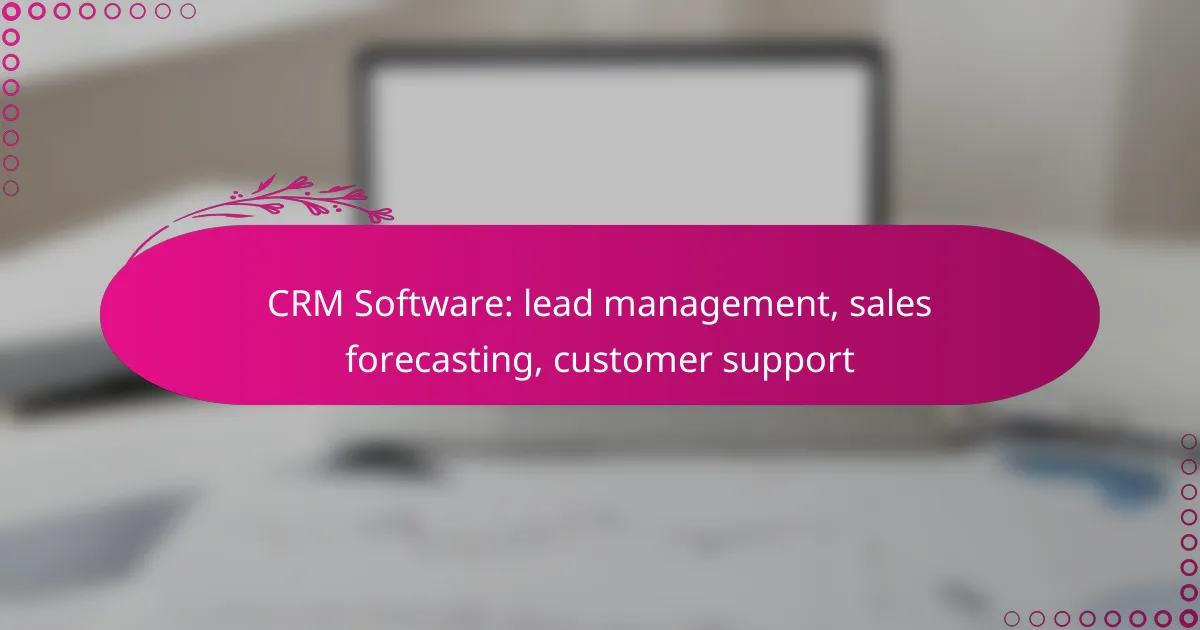CRM software plays a crucial role in managing leads, forecasting sales, and enhancing customer support. By streamlining lead capture and nurturing processes, it helps businesses effectively track potential clients. Additionally, advanced analytics and reporting features enable accurate sales predictions, while robust customer support functionalities ensure efficient communication and issue resolution.
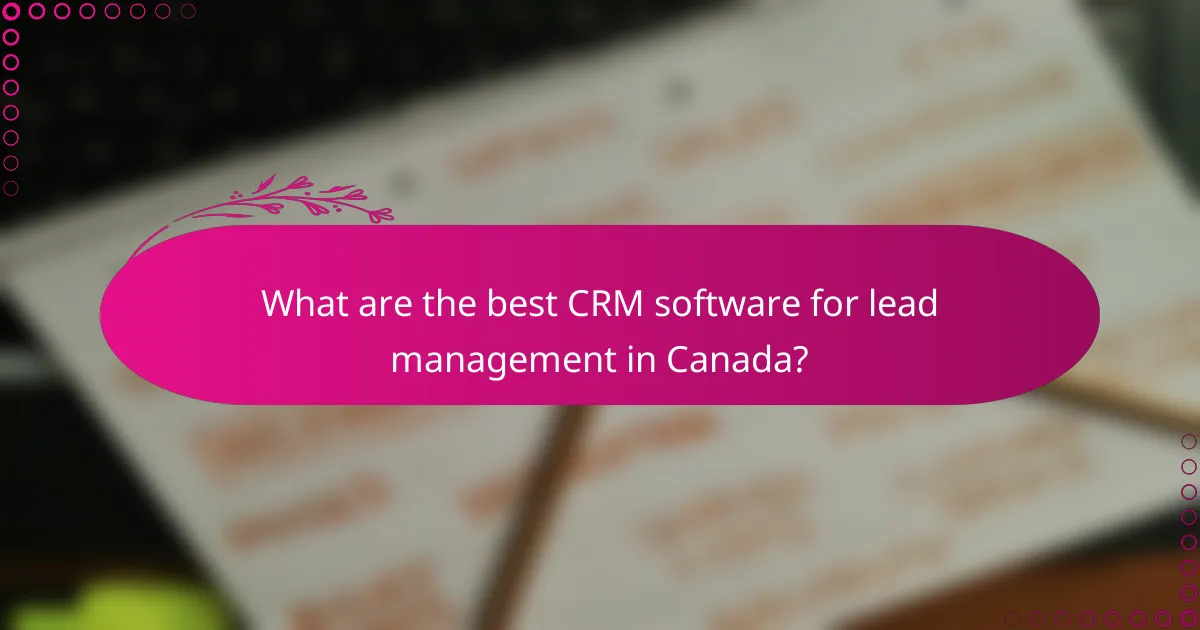
What are the best CRM software for lead management in Canada?
The best CRM software for lead management in Canada includes solutions that streamline the process of capturing, tracking, and nurturing leads. Key considerations involve ease of use, integration capabilities, and pricing structures that fit various business sizes.
Salesforce
Salesforce is a leading CRM platform known for its robust lead management features. It allows businesses to automate lead capture, scoring, and nurturing processes, making it easier to convert leads into customers.
With customizable dashboards and reporting tools, Salesforce provides insights into sales performance and forecasts. However, its complexity may require a steeper learning curve and potentially higher costs, especially for smaller businesses.
HubSpot CRM
HubSpot CRM is a user-friendly option that offers free lead management tools, making it accessible for small to medium-sized businesses in Canada. It includes features like email tracking, lead scoring, and pipeline management.
HubSpot’s integration with other HubSpot tools enhances its functionality, allowing for seamless marketing and sales alignment. The free tier is generous, but advanced features may require a subscription to their paid plans.
Pipedrive
Pipedrive is designed with sales teams in mind, focusing on visual sales pipelines and lead tracking. Its intuitive interface helps users manage leads effectively, ensuring no opportunity is overlooked.
This CRM is particularly beneficial for small businesses looking for straightforward lead management without unnecessary complexity. Pricing is competitive, but some users may find limited reporting features compared to larger platforms.
Zoho CRM
Zoho CRM offers a comprehensive suite of lead management tools tailored for businesses of all sizes. It includes features like lead scoring, workflow automation, and detailed analytics to help optimize sales processes.
Zoho’s pricing is flexible, with options suitable for startups to larger enterprises. However, users should be aware of potential integration challenges with third-party applications.
Freshsales
Freshsales provides a complete lead management solution with features such as AI-based lead scoring, email tracking, and built-in phone capabilities. Its user-friendly interface makes it easy for teams to adopt.
This CRM is particularly advantageous for businesses looking for an all-in-one solution at a reasonable price. However, advanced customization options may be limited compared to more established CRMs like Salesforce.
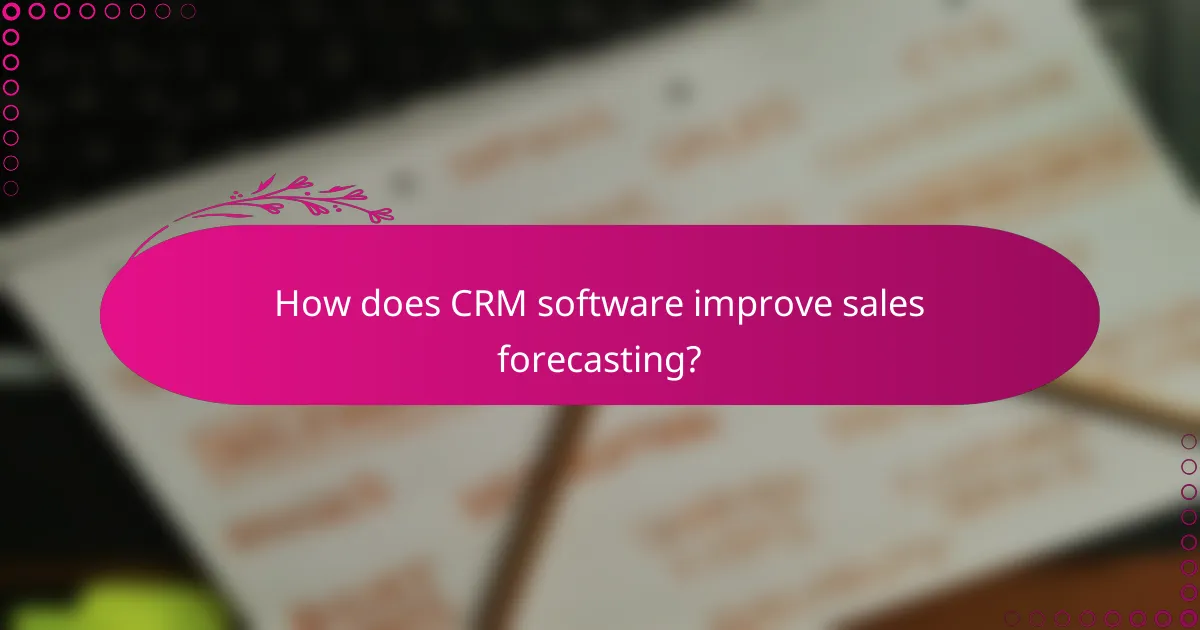
How does CRM software improve sales forecasting?
CRM software enhances sales forecasting by leveraging data analytics, integrating with existing sales tools, and providing real-time reporting. These capabilities allow businesses to make informed predictions about future sales performance based on historical data and current trends.
Data analytics capabilities
CRM systems utilize advanced data analytics to process large volumes of sales data, identifying patterns and trends that inform forecasting. By analyzing past sales performance, customer behavior, and market conditions, businesses can generate more accurate forecasts.
For example, a CRM might reveal that sales typically increase by a certain percentage during specific months, allowing companies to prepare accordingly. Utilizing predictive analytics can further enhance accuracy by forecasting future sales based on various scenarios.
Integration with sales tools
Effective CRM software integrates seamlessly with various sales tools, such as email marketing platforms and e-commerce systems. This integration ensures that all sales data is centralized, providing a comprehensive view of customer interactions and sales performance.
When sales teams can access integrated data from multiple sources, they can better understand customer needs and adjust their strategies. This holistic approach leads to more reliable sales forecasts, as all relevant information is considered.
Real-time reporting features
Real-time reporting features in CRM software allow businesses to monitor sales performance as it happens. This immediacy helps teams identify trends and shifts in customer behavior quickly, enabling them to adjust their forecasts accordingly.
For instance, if a sudden spike in inquiries is detected, sales teams can anticipate an increase in sales and prepare their resources. Regularly reviewing these reports can help avoid common pitfalls, such as overestimating or underestimating sales potential based on outdated information.
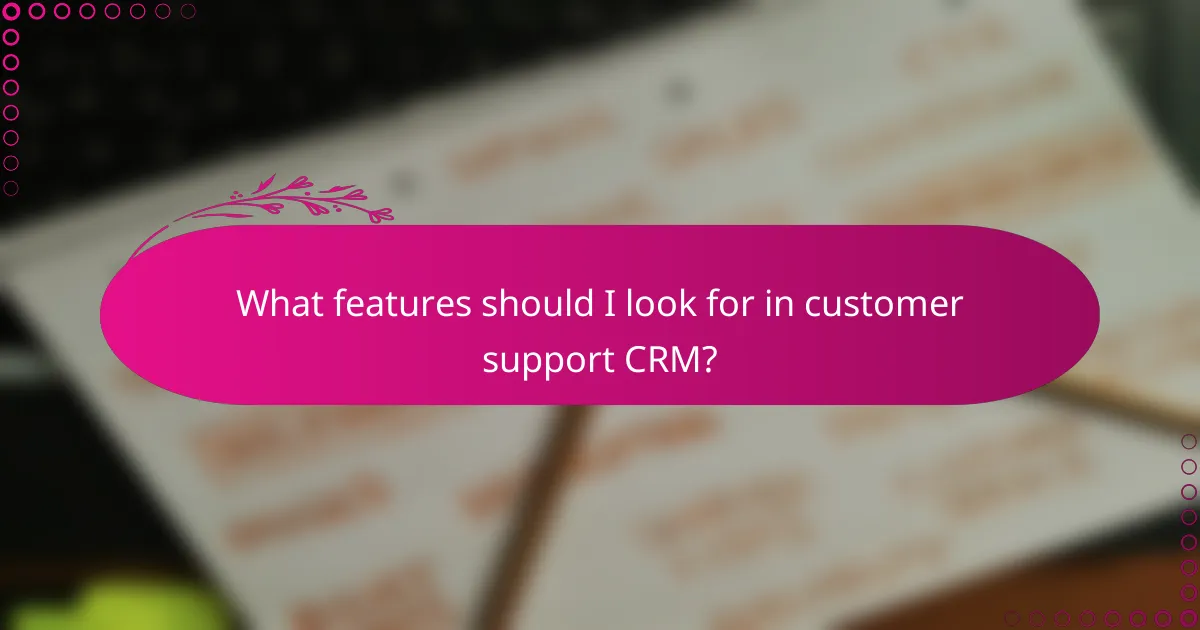
What features should I look for in customer support CRM?
When selecting a customer support CRM, prioritize features that enhance communication, streamline issue resolution, and improve customer satisfaction. Key functionalities include a robust ticketing system, knowledge base integration, and multi-channel support to cater to diverse customer needs.
Ticketing system
A ticketing system is essential for tracking customer inquiries and issues systematically. It allows support teams to prioritize and manage requests efficiently, ensuring no customer is overlooked. Look for CRMs that offer automation features, such as ticket assignment and escalation, to enhance response times.
Consider systems that provide real-time updates and notifications, which keep both customers and agents informed about ticket status. This transparency can significantly improve customer satisfaction and trust.
Knowledge base integration
Integrating a knowledge base into your CRM can empower customers to find answers independently, reducing the volume of support requests. A well-organized knowledge base should include FAQs, troubleshooting guides, and how-to articles that are easily searchable.
Ensure the knowledge base is regularly updated and accessible across devices. This feature not only aids customers but also serves as a valuable resource for support agents, helping them resolve issues more quickly.
Multi-channel support
Multi-channel support allows customers to reach out through various platforms, such as email, chat, social media, and phone. A CRM that consolidates these channels into a single interface helps support teams respond more effectively and maintain consistent communication.
When evaluating CRMs, check for features that enable seamless transitions between channels. For instance, if a customer starts a chat and later calls, the support agent should have access to the chat history to provide a personalized experience. This continuity is crucial for enhancing customer loyalty and satisfaction.
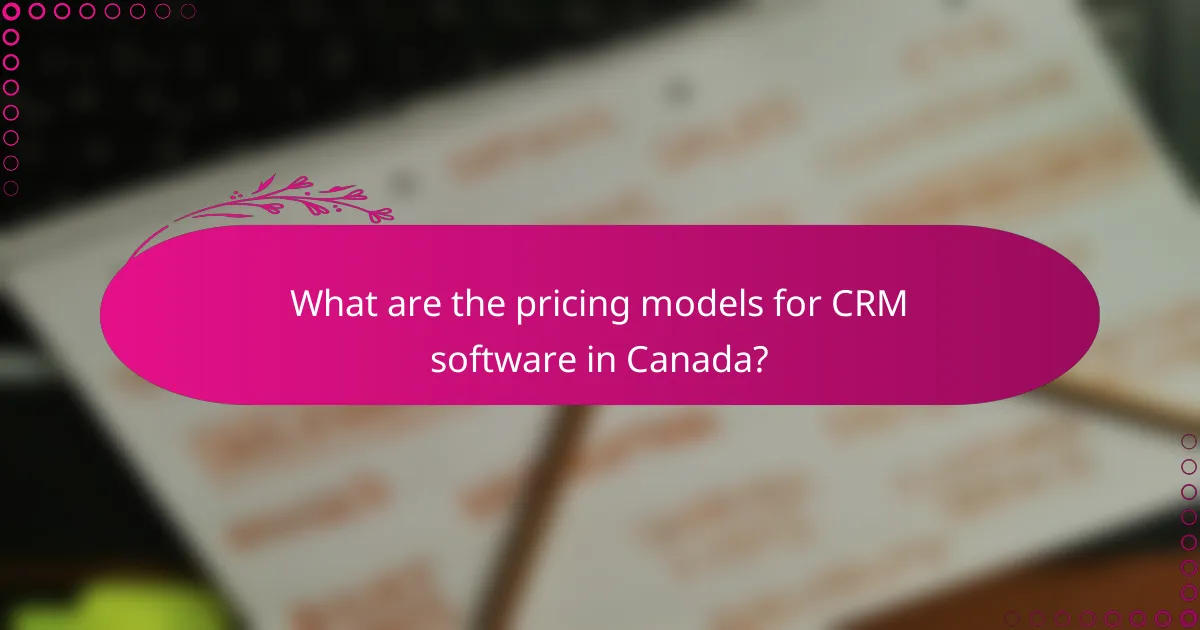
What are the pricing models for CRM software in Canada?
CRM software in Canada typically employs several pricing models, allowing businesses to choose based on their needs and budget. The most common models include subscription-based pricing, freemium options, and tiered pricing plans.
Subscription-based pricing
Subscription-based pricing is a prevalent model where businesses pay a recurring fee, usually monthly or annually, for access to CRM software. This model often includes different pricing tiers based on features, user counts, or storage capacity.
For example, a basic plan might cost around CAD 30 to CAD 50 per user per month, while more advanced plans with additional features can range from CAD 100 to CAD 200 per user per month. Companies should assess their requirements to choose the most cost-effective option.
Freemium models
Freemium models offer a basic version of the CRM software at no cost, allowing businesses to use essential features without any financial commitment. This model is ideal for small businesses or startups looking to test the software before investing.
However, to access advanced features or higher limits, users typically need to upgrade to a paid plan. While this model can be attractive, businesses should be cautious of potential limitations in the free version that may hinder growth.
Tiered pricing plans
Tiered pricing plans provide multiple levels of service, each with a different set of features and pricing. This allows businesses to select a plan that aligns with their specific needs and budget constraints.
For instance, a CRM provider might offer three tiers: a basic plan for CAD 25 per user per month, a professional plan for CAD 75, and an enterprise plan for CAD 150. Companies should evaluate the features included in each tier to ensure they are getting the best value for their investment.
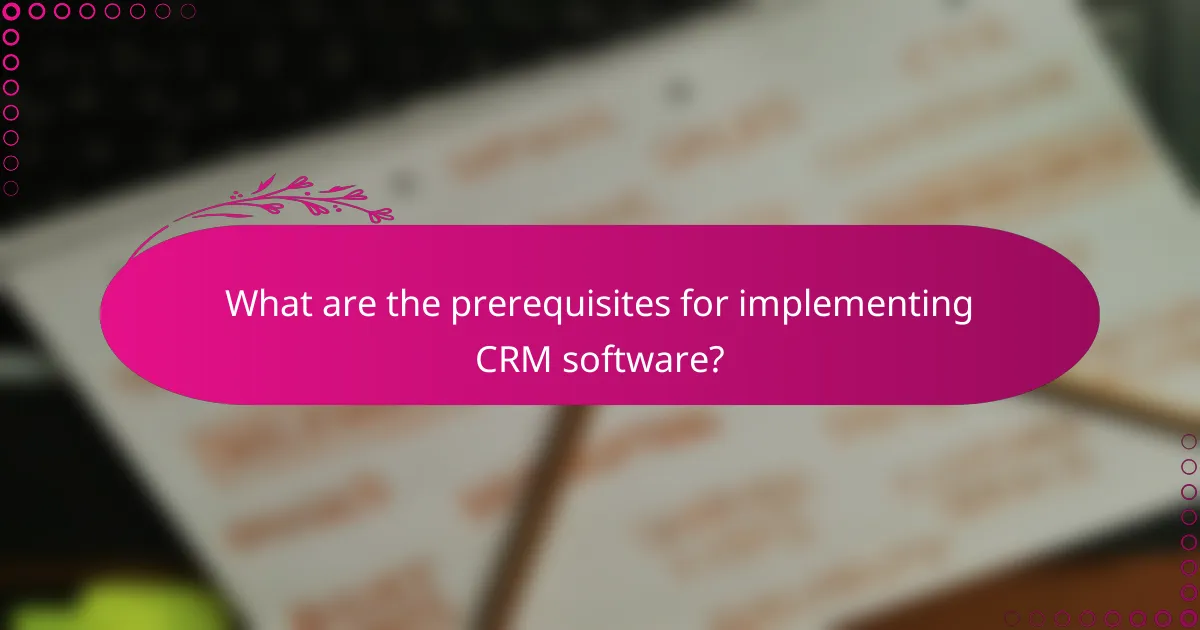
What are the prerequisites for implementing CRM software?
Implementing CRM software requires a clear understanding of your business needs, a solid data migration plan, and adequate team training. These prerequisites ensure a smooth transition and effective use of the CRM system.
Data migration strategy
A robust data migration strategy is essential for transferring existing customer data into the new CRM system. This involves assessing the quality of current data, determining what information is necessary, and deciding on the best methods for extraction and import.
Consider using a phased approach to migration. Start with critical data sets, such as contact information and sales history, before moving on to less vital data. This helps mitigate risks and allows for troubleshooting before full implementation.
Team training requirements
Effective team training is crucial for maximizing the benefits of your CRM software. Employees should be familiar with the system’s features and functionalities to ensure they can use it efficiently in their daily tasks.
Training sessions can vary in format, from hands-on workshops to online tutorials. It’s beneficial to provide ongoing support and resources, such as user manuals or FAQs, to address questions as they arise. Aim for training to be completed before the CRM goes live to minimize disruptions.
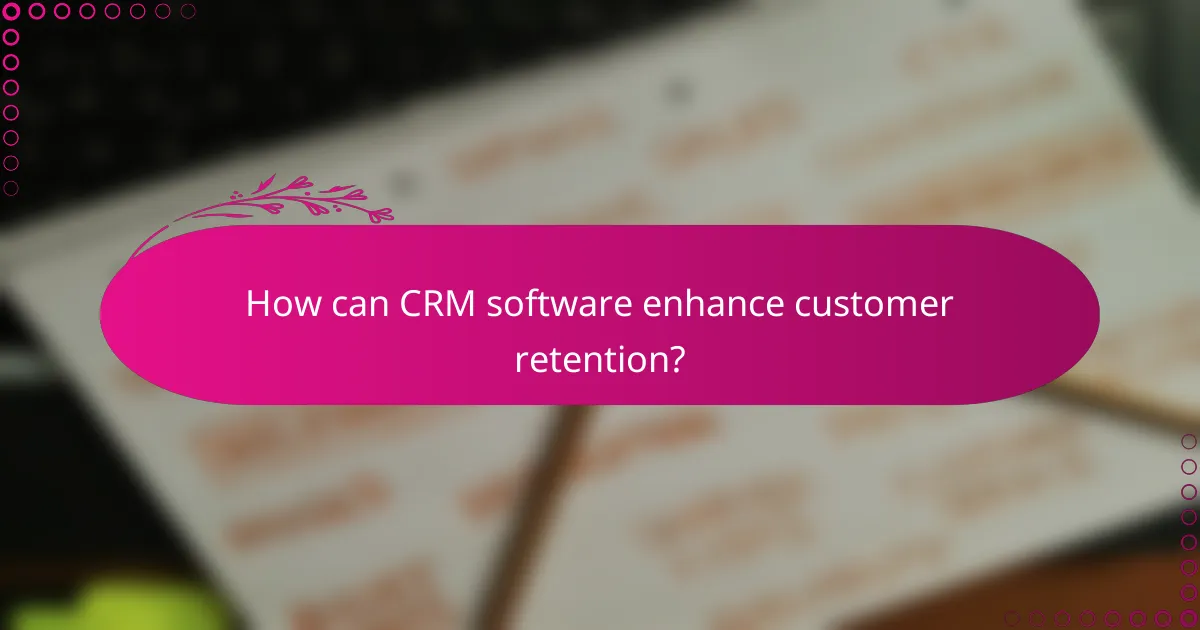
How can CRM software enhance customer retention?
CRM software enhances customer retention by enabling businesses to manage relationships more effectively through data-driven insights and personalized interactions. By leveraging customer information, companies can anticipate needs, resolve issues promptly, and foster loyalty.
Personalized communication
Personalized communication is essential for retaining customers, as it makes them feel valued and understood. CRM systems allow businesses to segment their audience based on various criteria such as purchase history, preferences, and behavior, enabling tailored messaging that resonates with individual customers.
For example, a retail business can use CRM data to send personalized offers to customers who frequently purchase specific products. This targeted approach not only increases engagement but also encourages repeat purchases, ultimately boosting retention rates.
To implement effective personalized communication, businesses should regularly update customer profiles and utilize automation tools within their CRM to send timely messages. Avoid generic communications that fail to connect with customers, and instead focus on creating relevant content that addresses their specific needs and interests.
